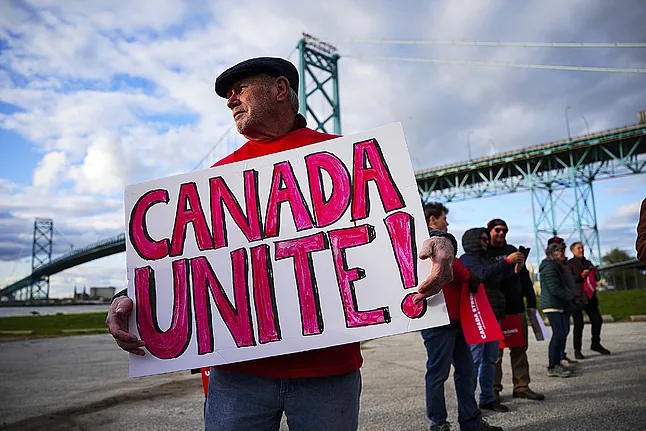Canada is holding federal elections today. Perhaps the most important in its modern history, certainly the ones that have garnered the most attention worldwide. They were supposed to be elections of change, more of an era change than a cycle change, with the exit through the back door, after a decade in power, of Justin Trudeau, the leader who went from hero and idol to a symbol of stagnation and failure. They were supposed to be elections of settling scores, not only with the dominant Liberal Party, but with a way of understanding politics, society, the environment. They were supposed to be elections about the economy, the cost of living, about being woke, about common sense, the frustration and anger prevailing on all continents. It was supposed to be all that, and the great moment of the conservative Pierre Poilievre. Until Donald Trump returned.
In a few weeks, the U.S. president turned around the polls and the entire country, generating a patriotic and nationalist wave difficult to define, but very easy to perceive. It can be seen in the flags covering streets and porches, in messages with maple leaves in supermarkets urging to buy national products. In t-shirts and hockey games, booing the U.S. anthem. In calls for boycotts or stories of grievances and mistreatment at the borders. It is something that marks every campaign event of the social democrats and liberals, resurrected against all odds by the attacks, insults, and disdain of Trump and the clearly real fear that the escalation with the southern neighbor will go far beyond tariffs.
At the end of November, Trudeau traveled to Mar-a-Lago, the residence of President-elect Trump, to discuss tariffs, fentanyl, and borders, one of the American's campaign obsessions. That day, in what seemed like a joke, Trump said for the first time that the solution to all problems between both countries would be integration. There were laughs among the attendees, until it became clear that it was not a joke. From then on until Trudeau left office, the leader of the world's leading power repeatedly made the offer of integration, referring to the Canadian Prime Minister as "governor", saying that joining the U.S. was the best and almost the only option, even flirting with revising treaties from the 18th century to claim territories. When doubts about a possible military intervention were raised, it became clear that it was the end of an era. But not the one analysts had anticipated in 2024.
The rhetoric of the "51st state" alarmed Canadians, the trade war, defined as an attempt to destroy their economy, woke them up to the harsh reality of a world that no longer exists, a hostile one where nothing can be taken for granted, starting with friendship and collaboration after centuries of good relations.
Therefore, with the Trump doctrine looming, Mark Carney, the technocrat who led the Bank of Canada and the Bank of England, emerged as the leader of the Liberals, and now leads the polls, albeit narrowly. Trump has brought not a crisis, but the mother of all crises, and Canadians, often caricatured for their good nature, education, and restraint, seem to have extended a hand to the man who seems best defined as an expert in turbulent times and suffocated economies.
Conservative voters have not fled in droves. On the contrary, they hold the best numbers in almost two decades, with nearly 40% of the vote intention. But progressives seem to have rallied around Carney. Even in Quebec.
The campaign that concluded yesterday, marked by a massive hit-and-run on Saturday night, has moved to the rhythm of Trump. When he tightened, attacked, and bit, the balance shifted and penalized a tory party, conservative, unable to stand up to the bully threatening not only a government but a proud nation. When Trump hit the brakes and stopped tweeting, provoking and poking (which coincided with the departure of his nemesis Trudeau, whom he had despised since coming to power and who represented everything opposite to what he believes), the campaign refocused on housing, social services, migratory pressure, brutal economic stagnation, and the Liberal Party's momentum deflated.
Today's elections are therefore, in a way, elections of remembrance and forgetfulness at the same time. Poilievre shouts at every rally about the "lost decade of the Liberals," claiming they are trying to create a "collective amnesia" about the Trudeau government, taxes, lack of growth, the 2023 fires, environmental policies, about what they consider the worst possible example of institutional wokeism.
On the other side, their rivals denounce in their appearances, notes, and tweets how the tories are trying to make people forget the similarities with the Republican Party, with the nationalism of America First, with criticisms of policies against global warming, against decarbonization measures. Or how Poilievre, a supporter of fossil fuels, cryptocurrencies, copying Trumpist slogans, is unable to openly criticize the U.S. leader while promising to return the country to an abstract and idyllic past. That's why Canadians vote today with certainty and a dilemma. They will have to forget, but it's not clear what.
